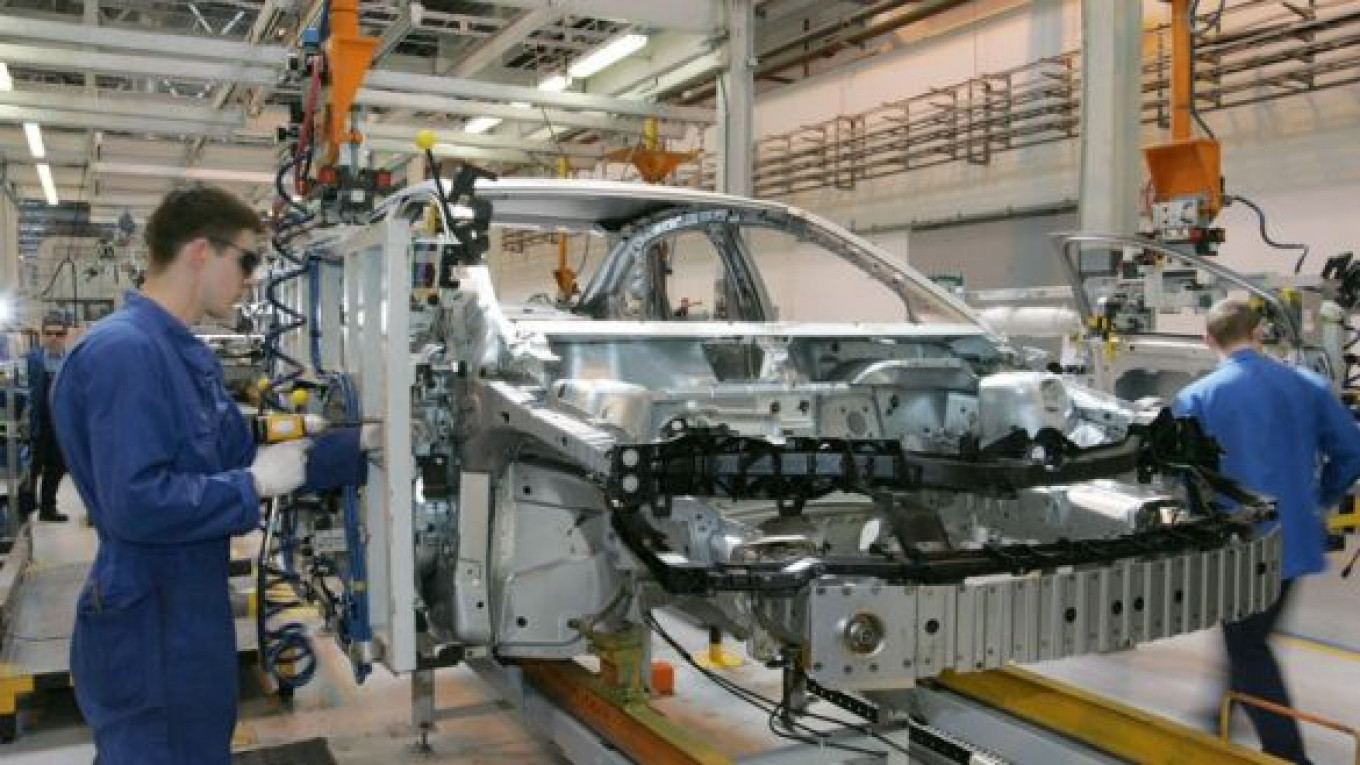Sollers and Ford Motor said Friday that they tentatively agreed to combine their Russian plants into a joint venture to produce Ford cars, vans and pickup trucks in a plan that could boost sales to at least 300,000 by 2015.
Earlier that day, Sollers announced that it decided not to partner with Fiat in a $3.3 billion domestic car assembly project. The government had said the Russian-Italian alliance would be one of the two mainstays of the local car industry.
Having begun local production in 2002, Ford now appears to have replaced the Italians as one of the leading foreign automakers working in Russia. Sollers made the announcements a day after President Dmitry Medvedev ended his visit to Italy.
The government is also counting on the AvtoVAZ venture with France's Renault to help bring the industry to the next level of modernization.
The joining of forces by Sollers and Ford is in line with the government strategy to develop the domestic car industry through 2020, which is largely based on establishing "strong alliances" with foreign carmakers, a spokeswoman for the Industry and Trade Ministry said.
Ford and Sollers said they were seeking to sign an assembly agreement with the government — a formal commitment that would require them to increase output over the next four years in exchange for reduced import duties on car parts.
Though Ford declined to name the production target of the joint venture, manufacturers have to reach a target of least 300,000 vehicles per year under such an agreement to qualify for government benefits.
Carmakers that want to take advantage of this benefit have until Feb. 28 to sign up.
The 50-50 venture between Ford and Sollers will include the Ford plant in Vsevolozhsk, outside St. Petersburg, and two Sollers facilities in the Tatarstan republic, the companies said in a joint statement that announced their memorandum of understanding.
Expected to start operations by the end of this year, the company will manufacture and distribute "a range of Ford passenger cars and light commercial vehicles," the carmakers said.
The Ford St. Petersburg plant produced 80,000 Mondeo and Focus models last year, but has the capacity to produce 125,000 cars per year. Sollers has the capacity to make 195,000 vehicles in Tatarstan.
"We are delighted to be taking this next step for Ford in Russia," Ford Europe chief executive Stephen Odell said in the statement.
Sollers chief Vadim Shvetsov, who happens to be married to the daughter of Industry and Trade Minister Viktor Khristenko, was quoted in the statement as saying he was "inspired" by the chance to team up with Ford and confident that their joint efforts would ensure them a leading position on the Russian market.
Ford brings to the proposed joint venture its manufacturing experience, an extensive existing dealer network and access to the global range of Ford's latest products, the statement said.
Sollers would contribute an "invaluable knowledge of the market and state-of-the-art manufacturing capacity," said Ford spokeswoman Yekaterina Kulinenko.
Car sales have been bouncing back in Russia, fueled by the government's cash-for-clunkers program that is expected to end this spring. The government is considering a similar program for commercial vehicles.
In addition to vehicles, the Ford-Sollers joint venture would produce engines, operate a stamping facility to provide more local parts and establish research and development activities.
It will also handle the import and distribution of Ford brand products, parts and accessories in Russia.
Ford slid one notch to become No. 5 carmaker worldwide last year, according to the Truthaboutcars.com portal.
Fiat will not abandon plans to expand in Russia, it said in a joint statement with Sollers.
"Fiat and Sollers have now determined to pursue independent strategies to further develop their respective presence in Russia," the companies said.
A Fiat spokesman in Italy contacted by The Moscow Times declined to elaborate on the issue. Reuters reported that the company planned to build a plant in Russia on its own with an annual capacity of 500,000 vehicles.
That is the same number of vehicles that Sollers and Fiat initially intended to jointly produce every year, by 2016.
The companies signed a memorandum of understanding in February last year, aiming to create a joint venture based in Naberezhniye Chelny, where Sollers already makes Fiat Linea and Fiat Albea sedans, as well as Fiat Doblo Panorama vans.
Fiat has enough money to finance the construction of its own facilities, a spokesman said, Reuters reported from Italy.
Sollers spokeswoman Zoya Kaika declined to comment on the reason for ending the agreement with Fiat, saying only that it was "a mutual decision."
The joint venture with Fiat faced financing challenges. Sollers and the Italians sought a 15-year 2.1 billion euro ($2.9 billion) loan from state-owned Vneshekonombank in exchange for a minority stake in the enterprise, but in December the lender rejected the proposal. Shvetsov said at the time that Sollers would consider talking to commercial banks about financing.
A Message from The Moscow Times:
Dear readers,
We are facing unprecedented challenges. Russia's Prosecutor General's Office has designated The Moscow Times as an "undesirable" organization, criminalizing our work and putting our staff at risk of prosecution. This follows our earlier unjust labeling as a "foreign agent."
These actions are direct attempts to silence independent journalism in Russia. The authorities claim our work "discredits the decisions of the Russian leadership." We see things differently: we strive to provide accurate, unbiased reporting on Russia.
We, the journalists of The Moscow Times, refuse to be silenced. But to continue our work, we need your help.
Your support, no matter how small, makes a world of difference. If you can, please support us monthly starting from just $2. It's quick to set up, and every contribution makes a significant impact.
By supporting The Moscow Times, you're defending open, independent journalism in the face of repression. Thank you for standing with us.
Remind me later.






